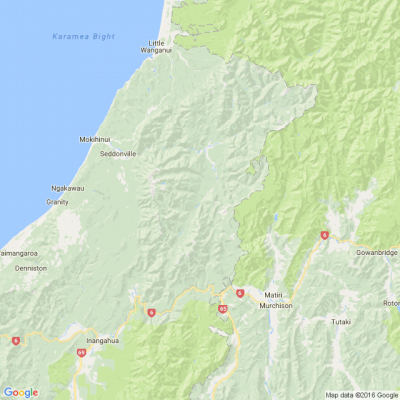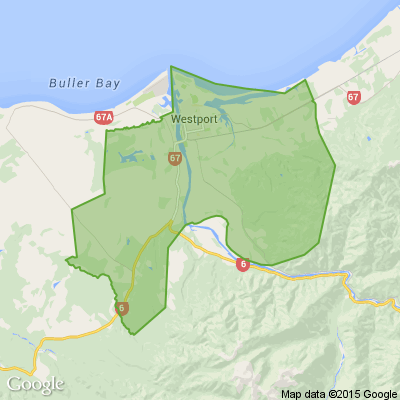Forget the reports, time for bulldozers say politicians
By local democracy reporter Lois Williams:
Westland mayor Helen Lash says her council is thrilled that funding has at last been released to protect valuable farms and homes on the south bank of the wild Waiho River at Franz Josef.
But she warns there won’t be a cent to spare for red tape or paperwork.
Regional Development Minister Shane Jones announced a grant of $6 million this week for the West Coast Regional Council to strengthen and extend the Waiho stop banks, leaving local ratepayers to find the remaining $4m for the job.
Lash said the grant would be welcomed by landowners waiting to see if the Government would come to their aid, while large chunks of the land disappeared with every flood.
“But it’s $2m shy of what the council thought it would get so they’re going to have to make every cent work to get the right result, and not waste any on more reports and consultants’ fees.”
The last Labour government spent $12.5m shoring up stop banks on the north bank of the Waiho to protect the tourist township but withheld another $8m originally promised for the south bank with its farms and lifestyle blocks.
It wanted to see a long- term plan, including retreat, for the community labelled “Disaster Central” by geologists, before spending more money,
The stony bed of the short river has risen 8m since the 1950s and now sits well above the level of the town.
That process is speeding up as the glacier retreats, releasing rocks and gravel to the flats below.
And to cap it off, Franz Josef is perched right on the Alpine Fault, which is due for its 300-yearly major rupture.
When the Waiho River Management Strategy came out last October, saying the south bank would eventually have to be abandoned to the river, property values there plummeted, destroying equity overnight.
Lash said the landowners had been "horribly mucked around" by the decision makers, and the uncertainty.
“You can’t do that to people’s lives. Every flood they go into stress mode. When you have no skin in the game you don’t get the gravity of it.”
River management is the Regional Council’s job, the mayor says, but the Westland District Council wants to be heavily involved in the stop bank project this time, to make sure ratepayers got the fullest possible benefit from the $6m.
“We want to be sure the community gets the best protection and maximum gain out of it and I’m sure that’s what the government wants to see as well.”
Regional Development Minister Shane Jones - in Greymouth this week for a meeting with civic leaders - said Lash was right about that.
“I have insisted that MBIE maximise the amount of dough that’s spent on practical delivery. We don’t need reams of reports from consultants - we need picks and shovels swinging to and fro, and delivery.”
The Franz Josef project, and others in Nelson approved for funding this week under the Government’s 'Before the Deluge' banner, were all bulldozer-ready, the minister said.
“There’s a lot of uncertainty in the pipeline from (contracting) firms saying they can’t keep their workforce on unless the money keeps flowing.
“The added virtue of these West Coast projects is that the damn things are consented so the mahi can take place as soon as possible.”
Long term, the fate of Franz Josef, the Waiho Flats and those who live and farm there would require decisions well above his paygrade, Shane Jones said.
“You are wrestling with Mother Nature there, and all hell could break loose with that river."
But it’s not a fight that should be conceded – at least, not yet, he said.
“The name of our party is New Zealand First, not Climate First. For as long as I’m around, we are going to spend money and work with communities to adapt - so we can generate the necessary solutions over a longer period of time."
A cynic would say that was only putting off the inevitable, he said.
“But I feel grossly uncomfortable chasing anyone out of where they are. I’ve got a lot of sympathy for the people on farms, being told they should leave.
“Who’s going to pay them to leave? Not Mother Nature."
Poll: Should the government levy industries that contribute to financial hardship?
As reported in the Post, there’s a $30 million funding gap in financial mentoring. This has led to services closing and mentors stepping in unpaid just to keep helping people in need 🪙💰🪙
One proposed solution? Small levies on industries that profit from financial hardship — like banks, casinos, and similar companies.
So we want to hear what you think:
Should the government ask these industries to contribute?

-
59.9% Yes, supporting people is important!
-
25.7% No, individuals should take responsibility
-
14.4% ... It is complicated
A Neighbourly Riddle! Don’t Overthink It… Or Do?😜
Do you think you know the answer? Simply 'Like' this post if you know the answer and the big reveal will be posted in the comments at 2pm on the day!
If you multiply this number by any other number, the answer will always be the same. What number is this?

Have you got New Zealand's best shed? Show us and win!
Once again, Resene and NZ Gardener are on the hunt for New Zealand’s best shed! Send in the photos and the stories behind your man caves, she sheds, clever upcycled spaces, potty potting sheds and colourful chicken coops. The Resene Shed of the Year 2026 winner receives $1000 Resene ColorShop voucher, a $908 large Vegepod Starter Pack and a one-year subscription to NZ Gardener. To enter, tell us in writing (no more than 500 words) why your garden shed is New Zealand’s best, and send up to five high-quality photos by email to mailbox@nzgardener.co.nz. Entries close February 23, 2026.









 Loading…
Loading…





